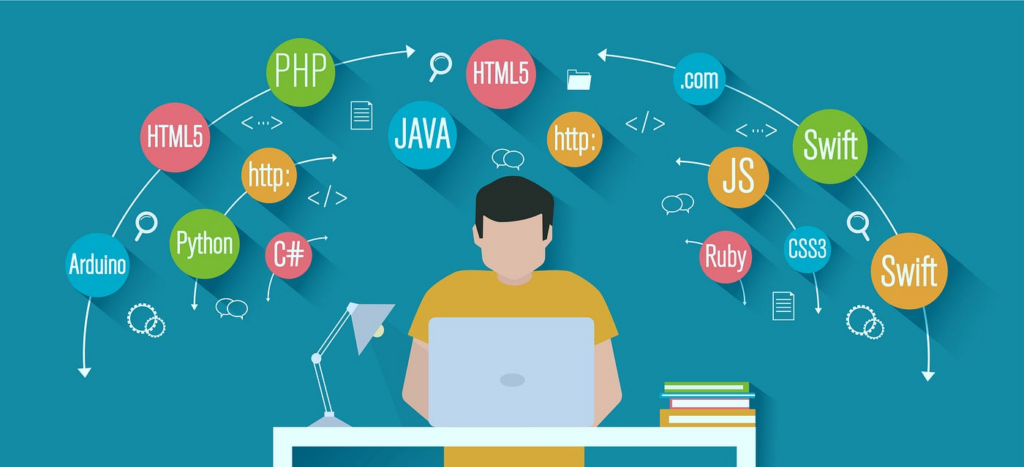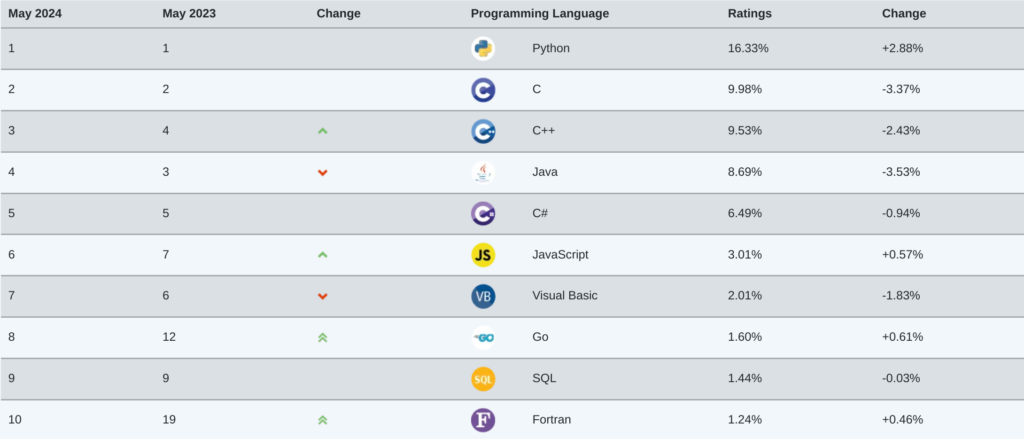If you’re thinking about advancing your career or making a complete switch, mastering a programming language might come to mind. In such a situation, you might question: Which language to learn? So, here we’ll explore the ten most popular programming languages, which can provide various benefits and support you in different ways.
The selection of top programming languages is based on data collected from the TIOBE Programming Community Index; TIOBE Index is an indicator of the popularity of programming languages that gets updated monthly.

A programming language is essentially a set of directions crafted by a programmer for a computer to execute and achieve a specific goal. These directions are typically presented as a structured code following a specific syntax unique to each programming language.
Top 10 Programming Languages: May 2024

1. Python
Python programming is powering the global job market due to its clear advantages. It is the most popular programming language globally and stands at the top of the list.
Python operates seamlessly across various platforms, including Windows, Mac, Linux, and Raspberry Pi. Its concise syntax helps developers write programs with fewer lines than other languages. Moreover, Python supports diverse programming styles, including procedural, object-oriented, and functional approaches.
Career Opportunity: Software Engineer, DevOps Engineer, Data Scientist
Learn python for absolute beginners
2. C Programming language
C, a general-purpose programming language, was developed by Dennis Ritchie at Bell Laboratories in 1972. Despite being old, C remains a highly popular language, primarily because it serves as a foundational language in the field of computer science.
C is highly respected for its speed compared to other programming languages like Java and Python, and its versatility allows it to be utilized in various applications and technologies.
Career Opportunity: Software Developer, Application Developer, Tester
3. C++ Among Top 3
C++ is a middle-level programming language developed in the early 1980s as an extension of C. It is used to create computer programs and is one of the most used languages in game development.
C++ is an object-oriented programming language that provides programs with a clear structure, enabling code reuse and reducing development expenses.
Career Opportunity: Operating Systems and Compilers, Financial platforms, Database engines, Gaming industry.
Learn all about C programming language
4. JAVA
Java, acknowledged for its ease of learning and simplicity in usage, is an open-source and free programming language. Recognized for its security, speed, and power, it boasts of a vast community support comprising tens of millions of developers. Additionally, being object-oriented, Java provides a clear program structure, facilitating code reuse and ultimately reducing development costs.
Career Opportunity: Web developer, Application developer, Software Developer, Tester, etc.
5. C# – Game developers’ favorite
Derived from the C family, C # (C-Sharp) shares similarities with other widely used languages such as C++ and Java. Microsoft developed it and runs it on the .NET Framework. It is utilized for creating a wide array of applications, including web, desktop, mobile, and gaming.
C# is an object-oriented language that provides program clarity and facilitates code reuse, thus reducing development expenses.
Career Opportunity: Game Developer, Application Engineer
6. Javascript
JavaScript is a programming language used to make websites more attractive. It’s lightweight, cross-platform, and single-threaded. It operates as an interpreted language, executing code line by line to provide increased flexibility.
It offers numerous libraries, frameworks, and APIs to facilitate tasks. It efficiently handles client-side and straightforward tasks while working together with other programming languages to enhance its versatility.
Career Opportunity: Game Developer, Application Engineer, front-end web development.
7. Visual Basic
Visual Basic (VB), an object-oriented language and development environment introduced by Microsoft in 1991, has evolved from the BASIC language, originally standing for ‘Beginners All-purpose Symbolic Instruction Code.’
Developers can easily modify code sections within the VB programming framework using graphical user interface (GUI) features. They can drag and drop objects to make changes, defining various elements’ behavior, function, and appearance with graphical tools.
Career Opportunity: DevOps Engineer, QA Automation Engineer, Software Developer
8. Go
Go is a procedural programming language developed by Robert Griesemer, Rob Pike, and Ken Thompson at Google in 2007 and launched as an open-source programming language in 2009. It is designed to emphasize simplicity, efficiency, and ease of learning, making it a popular choice for building scalable network services, web applications, and command-line tools.
An essential feature of Go is its automatic garbage collection, which manages memory without manual intervention. This minimizes the risk of memory leaks and bugs associated with manual memory management.
Career Opportunity: Software developer, cloud developer, full-stack developer
9. SQL
SQL stands for Structured Query Language which is used to access and manipulate data in databases. It executes queries to create, update, delete, and retrieve data in databases such as MySQL, Oracle, PostgreSQL, and others.
Career Opportunity: Database Administrator, Database Developer, Database Tester, Data Scientist
10. Fortran
Previously known as FORTRAN and short for Formula Translation, stands out as one of the earliest programming languages designed for numeric calculations and scientific computing.
Fortran is a fundamental programming language that is extensively used in scientific fields, including computational physics, computational fluid dynamics, and numerical weather prediction. It is frequently used for benchmarking programs and ranking the world’s fastest supercomputers, reinforcing its position as a staple in high-performance computing environments.
Career Opportunity: Software Engineer, Back-end development, Web Development Specialist














